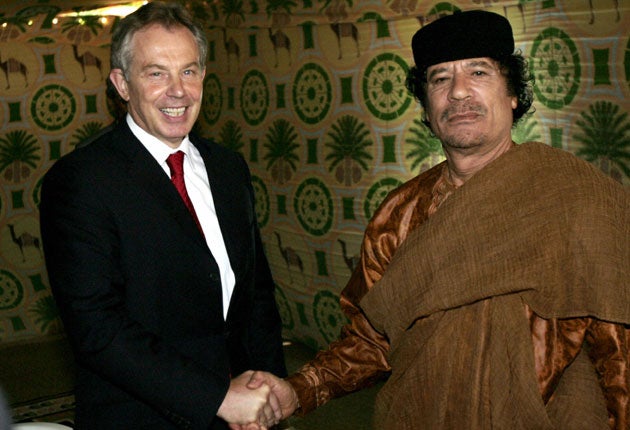Revealed: Blair's secret calls to Gaddafi
Ex-PM phones Libyan despot – and urges him to quit, while SAS mounts daring rescue of oil workers stranded in desert

Your support helps us to tell the story
From reproductive rights to climate change to Big Tech, The Independent is on the ground when the story is developing. Whether it's investigating the financials of Elon Musk's pro-Trump PAC or producing our latest documentary, 'The A Word', which shines a light on the American women fighting for reproductive rights, we know how important it is to parse out the facts from the messaging.
At such a critical moment in US history, we need reporters on the ground. Your donation allows us to keep sending journalists to speak to both sides of the story.
The Independent is trusted by Americans across the entire political spectrum. And unlike many other quality news outlets, we choose not to lock Americans out of our reporting and analysis with paywalls. We believe quality journalism should be available to everyone, paid for by those who can afford it.
Your support makes all the difference.Tony Blair, widely criticised in recent days for offering Muammar Gaddafi "the hand of friendship" seven years ago, made an extraordinary personal intervention when he twice phoned the embattled Libyan dictator on Friday and asked him to stop killing protesters rising up against the regime.
Britain's former prime minister made two unannounced calls to Colonel Gaddafi on Friday – the day the Libyan President appeared in public and exhorted a crowd of his hardcore supporters to "defend the nation" against the uprising and "crush the enemy" behind it. That defiant call to arms suggests that Col Gaddafi – who has rapidly returned to the international pariah status he had before the "deal in the desert" he negotiated with Mr Blair in 2004 – simply ignored the man who pioneered the dictator's temporary rehabilitation by the West.
Reports from the Libyan capital yesterday suggested that the dictator was carrying out his threat to arm supporters to strike back against the uprising. As tensions rose, David Cameron ordered an SAS rescue mission to pick up 150 citizens stranded in the remote oil fields south of the port of Benghazi.
According to Whitehall sources, Mr Blair made an initial call to the Libyan President, who has ordered helicopter gunships to fire on protesters he described as "rats" and "cockroaches". The Middle East envoy urged him to cease the attacks. The sources suggested that, after consultations with the British Foreign Office, Mr Blair was told that the UK Government would prefer the Libyan President to step down, and so he agreed to phone him again and transmit that message. There was no comment from Mr Blair's office yesterday. Government sources could not say last night whether ministers knew in advance about the initial phone call.
The first oblique hint that Mr Blair might be in active contact with the Libyan regime came in a routine briefing on Friday in which US State Department spokesman P J Crowley said the former PM was among the international figures that Secretary of State Hillary Clinton had spoken to during the day. Asked why Mrs Clinton called Mr Blair and if it was because of "his dealings with Gaddafi over the Lockerbie bomber", the spokesman said of Mr Blair: "He has very important and valuable contacts inside of Libya."
Defenders of the "deal in the desert" – in which Col Gaddafi was to eschew global terror in return for having international oil companies help him extract Libya's massive oil reserves – have argued that it enabled the West to determine that Libya would give up plans for weapons of mass destruction.
But critics argue that Western business, and oil interests, lay behind the rapprochement with Gaddafi and that it was a serious strategic mistake to rebuild relations with the man who had supported the IRA with weapons and instigated Lockerbie.
Mr Blair has always said he never had any commercial relationship with anyone in the Gaddafi family or the Libyan government, but since leaving office he is understood to have travelled to Tripoli on business for the US bank JP Morgan Chase. He also met Gaddafi in Tripoli as recently as last summer.
Join our commenting forum
Join thought-provoking conversations, follow other Independent readers and see their replies
Comments